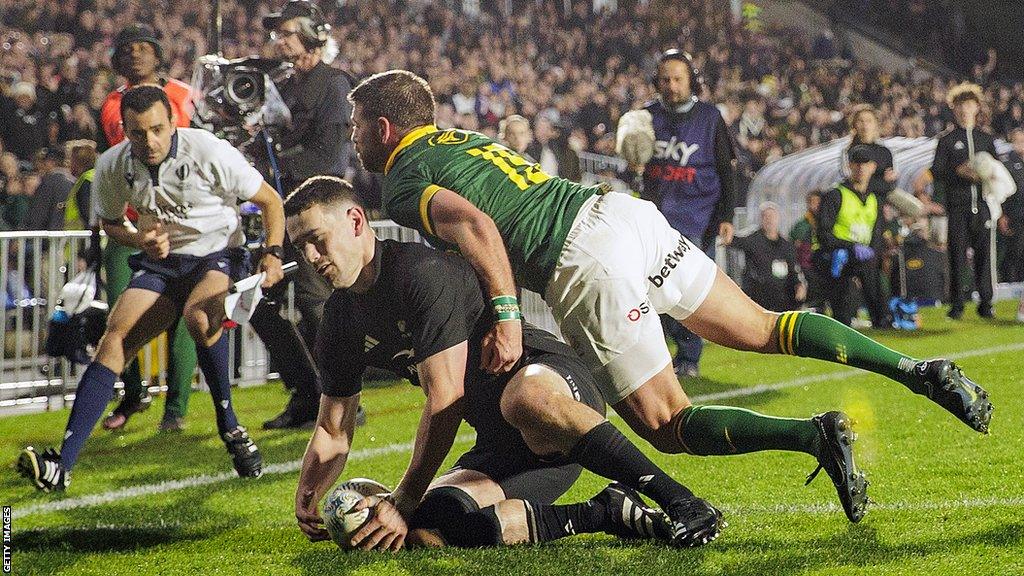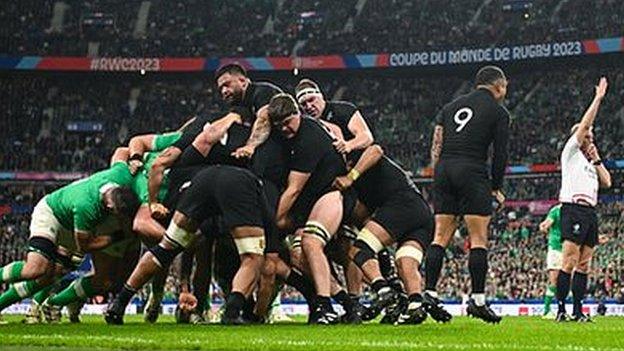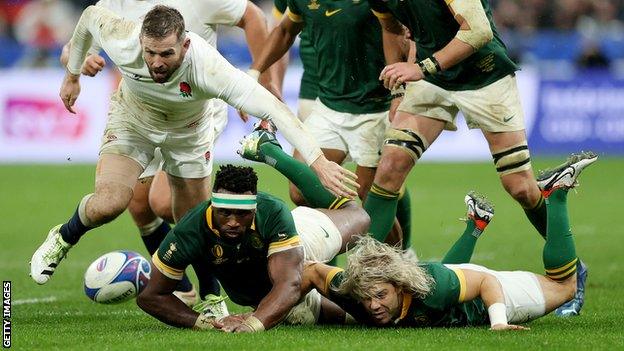Rugby World Cup 2023 final: New Zealand vs South Africa - where the game will be won and lost
- Published

New Zealand defeated South Africa 35-20 in the Rugby Championship in July
2023 Rugby World Cup final: New Zealand v South Africa |
|---|
Venue: Stade de France, Paris Date: Saturday, 28 October Kick-off: 20:00 BST |
Coverage: Listen to commentary on BBC Radio 5 Live (build-up from 19:30 BST) and follow text updates on the BBC Sport website and app. |
New Zealand will squeeze past South Africa in an "incredibly tight" Rugby World Cup final, says England's 2003 World Cup winner Paul Grayson.
Saturday's final in Paris pits New Zealand's creativity and flair against the physical power of defending champions South Africa.
"You might only get two chances in a World Cup final," Grayson told the Rugby Union Daily podcast.
"In the form they have shown you would not bet against New Zealand."
Ian Foster's side lost their opening game to France but bounced back with three big pool-stage wins before beating Ireland and Argentina in the knockout stage.
South Africa also finished second in their pool after a narrow 13-8 defeat by Ireland, before one-point victories over France and England in the knockout stage.
The match is a repeat of the 1995 final which hosts Springboks won in extra-time after a Joel Stransky drop-goal.
So where will be 2023 final be won and lost?
Will fatigue catch up with South Africa?
South Africa head coach Jacques Nienaber picked the same 23 players in the knockout games against France and England.
Those intense matches came after pool games against Scotland and Ireland, who like their knockout opponents are both ranked in the top six teams in the world.
New Zealand's draw on paper has been considerably kinder, having played only two out of the current top six teams.
They cruised to a 44-6 victory over Argentina in the first semi-final, giving them a chance to rest key players Aaron Smith and Beauden Barrett early in the second half, while also having the advantage of an extra day to prepare for the final.
"Finally, has the well run dry for South Africa? They were exhausted against England and didn't have any energy but by the skin of their teeth they found something in the scrum to pull off the win," said Grayson. "Can they do it again? It'll be absolutely fascinating."
Is South Africa's 7-1 split a gamble too far?

New Zealand gained the upper hand against Ireland in the scrum in the quarter-finals
To counter the potential fatigue the Springboks have named a 7-1 split of forwards to backs on the bench, meaning they have 15 forwards in their matchday squad of 23.
"They are going full metal jacket by picking every available monster," said Grayson. "They are coming for New Zealand in familiar fashion. Picking 15 forwards in their 23 signals what type game they are going to bring."
South Africa first deployed the 7-1 split in a record 35-7 thrashing of New Zealand before the tournament and used it a second time in their 13-8 defeat by Ireland.
Unlike the game against Ireland, the Springboks have not named a half-back on their bench with their only back option being Willie le Roux.
Le Roux would have to cover Handre Pollard if the fly-half - who replaced Manie Libbok after 31 minutes last week and kicked the match-winning penalty - has to go off, while wing Cheslin Kolbe will cover Faf de Klerk at scrum-half, having played "sweeper in sevens".
"The gamble is with one back on the bench, if you get an injury in specialist positions you have no cover except part-timers," Grayson explained.
"It puts you under enormous pressure as tactically and physically because you only have one card to play."
The World Cup winner believes the stereotype that New Zealand are a team of just flashy backs is incorrect. He says the All Blacks have a pack capable of matching the best in the world, and one that supplies the quick ball the backs need to do damage.
"Because we talk about them as a full-field team we never just pick their pack out and go - they can scrum, maul, pass and run," he added.
"It will be something that will be firing the All Blacks to say 'bring as many forwards as you want.'
"New Zealand had a perfect plan to get past Ireland in the quarter-finals and will have a plan mapped out for the South Africa juggernaut."
Can All Blacks win the kicking battle?

England failed to make a line break against South Africa in their narrow semi-final defeat
England's kicking game in wet weather during last Saturday's semi-final frustrated the defending champions and it was only in the last 10 minutes that the Springboks imposed their power game to secure a 16-15 victory.
Rain is also forecast for Saturday's final.
A wet ball could hinder New Zealand's renowned fast running game, but it is their kicking game which Grayson believes is their real weapon.
"If you want to drag and drop how you beat the Boks then England did it superbly," Grayson explained.
"The best team to regain possession from the kick battle is New Zealand and it always has been. It took everyone a long time to work out they kick away possession loads.
"When New Zealand get the ball back after employing their kicking game, they can do things other teams can't do."
Barrett brothers key for All Blacks
Following a home-series defeat by Ireland last summer, Foster decided to change up his team, with three important switches all coming from one family - the Barretts.
Beauden moved from fly-half to full-back, which in turn shifted brother Jordie into inside centre, with Scott breaking up the 2015 World Cup-winning second row pairing of Sam Whitelock and Brodie Retallick.
All three brothers start the final and have played a vital role in helping the All Blacks to their first final since 2015. The highlight was arguably Jordie's try-saving tackle to hold up Ireland's Ronan Kelleher in the quarter-final.
"They are all significant players in the way the All Blacks play, they are the spine of the team," Grayson said.
"Jordie has solved the puzzle for them at 12, moving from 15 and being replaced by his brother, who rewrote the book on how to play fly-half.
"The key for the All Blacks is if those three can go well they will have two fingers on the trophy already."